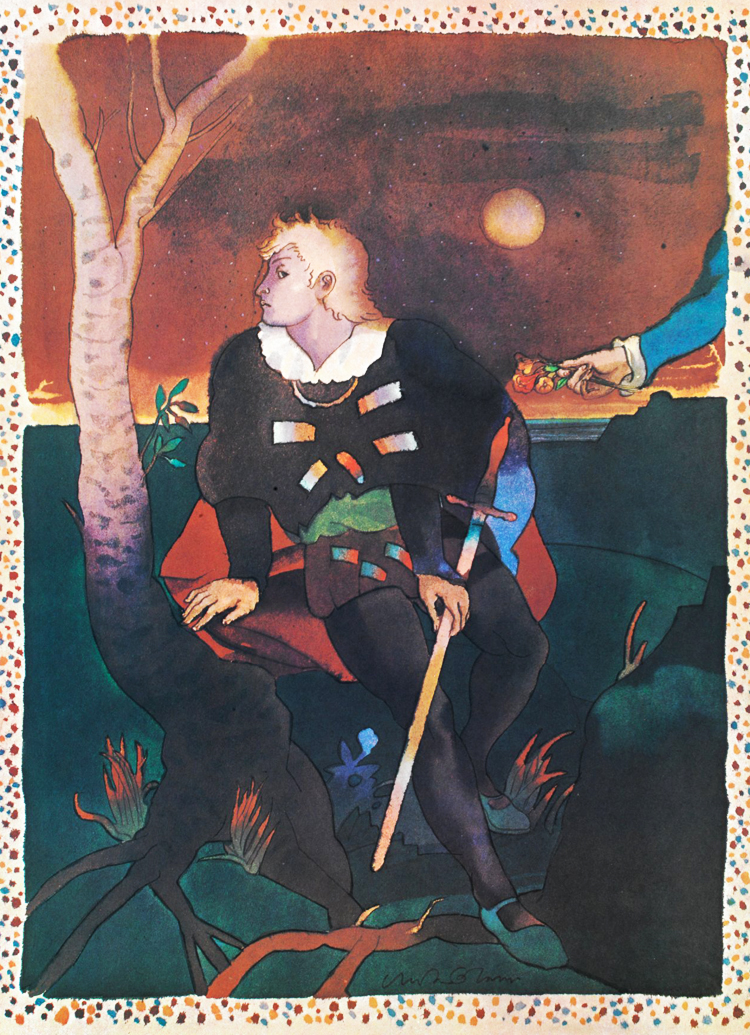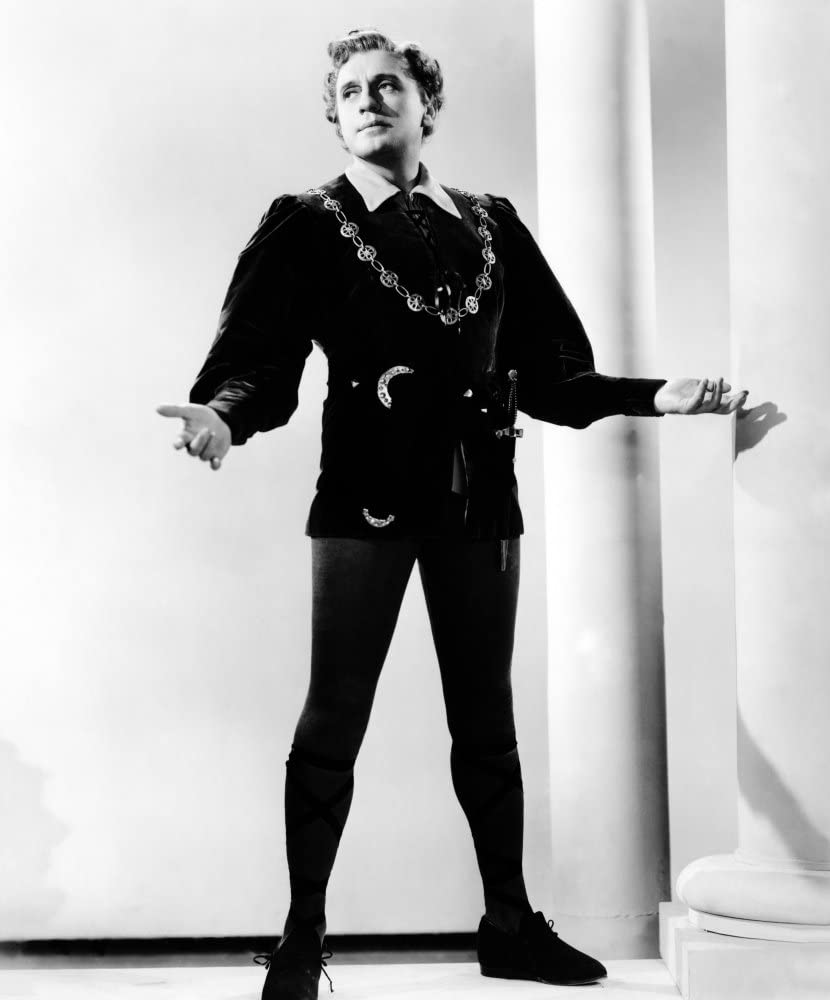Sensation! Featherweight KO’s Heavyweight Poet
by Reg Green (November 2020)

Hamlet, Milton Glaser, 1981
I’m ready to take on the heavyweight. Not just any heavyweight, the heavyweight. William Shakespeare. And I’m choosing to fight not over some obscure or juvenile piece but for one of the peaks: the ‘to be or not to be” soliloquy. I’m betting it can’t withstand even my puny blows.
It’s such a revered part of our heritage that I know I can’t expect anything but a Bronx cheer when I climb into the ring. Once, when I gently criticized it to an erudite friend, I thought he was going to turn me out of his house. Even for those who are kind enough to listen, it will only make things worse when I explain that my criticism isn’t about the poetry but the intellectual content. I’m only too aware that, as Harold Bloom has pointed out, critics of Hamlet start out with the disadvantage that he is far more intelligent than they are.
It’s true that the question it poses (when people feel life is unbearable, why do they go on bearing it?) is expressed in a cascade of gripping images. But having been confronted by the question in such a searing way, don’t we deserve an equally compelling answer?
[Voice of commentator: Wow, that punch to the midsection came out of nowhere.]
I’m not asking for the impossible, not a detailed picture of what the other side of the grave looks like. Indeed, as was said of Christopher Hitchens, the fact that he hasn’t sent in any articles since he died (or in Shakespeare’s case the 155th sonnet) is the strongest piece of evidence yet that there isn’t another side.
No, I don’t expect illumination about any of that. The let-down is that instead of giving us one of his signature phrases that make the whole world sigh “yes, that’s how I feel but I never knew how to say it,” what we get is a shallow, narrow and—dare I say it? —hackneyed answer: that it is the terror of something worse that makes holding on to life tolerable.
[Announcer: The champ’s face is flushed: those left jabs to the jaw are beginning to do some damage.]
The weakness of this answer, which surely is obvious, has been thrown into much sharper focus in our own lifetime by an entirely new development, satanic in its irony,: modern medicine has prolonged life so dramatically that tens of millions of people have come to fear what they had always yearned for most, a long life.
Who hasn’t seen marvelous specimens of man- or womanhood degenerate into pain-wracked hulks unable either to physically or mentally find their way to a bathroom and who simultaneously play havoc with the lives of the people they love most?
So why don’t more of those people get out the sleeping pills or the bodkin? To this, despite Hamlet, there isn’t a simple answer. Heading the list for the devout are the prohibitive teachings of their religion but even for the secular there is every refinement of reasons (and here comes the flurry of blows to the head you fans have been waiting for) including shame, pride, hope, fear, lethargy, lack of opportunity, ignorance of how to, the devastation to families, the possibility of a botched job—and for some, as Hamlet says, the anxiety that what we’d fly to would be even worse than what we have now. But surely, among the people you and I mix with, that last one is not the most important and absolutely not the only one, not the rub, not what makes cowards of us all.
Perhaps I shouldn’t pile on the fardels—or, to be more precise, unleash my haymaker—but when we featherweights have a big man on the ropes we can’t risk holding back. Far from death being full of bad dreams, it is precisely a dreamless sleep that, depending on the mood I’m in, puzzles/concerns/ disturbs/ or scares the living daylights out of me. It’s what Philip Larkin feared much more convincingly: “the total emptiness . . . not to be here, not to be anywhere.” That’s quite enough rub for me, thank you.
[Pandemonium in the stadium. The voice of commentator can barely be heard: “He’s down, folks, and he isn’t getting up.”]
So, sorry, Will, I have to say that on this fundamental question you need to do more work and I can’t understand why the world continues to pay this speech so much respect. I hope it is some consolation that nevertheless I’m giving the play as a whole four and a half stars.
Hamlet, Act III Scene I
To be, or not to be, that is the question:
Whether ’tis nobler in the mind to suffer
The slings and arrows of outrageous fortune,
Or to take arms against a sea of troubles
And by opposing end them. To die—to sleep,
No more; and by a sleep to say we end
The heart-ache and the thousand natural shocks
That flesh is heir to: ’tis a consummation
Devoutly to be wish’d. To die, to sleep;
To sleep, perchance to dream—ay, there’s the rub:
For in that sleep of death what dreams may come,
When we have shuffled off this mortal coil,
Must give us pause—there’s the respect
That makes calamity of so long life.
For who would bear the whips and scorns of time,
Th’oppressor’s wrong, the proud man’s contumely,
The pangs of dispriz’d love, the law’s delay,
The insolence of office, and the spurns
That patient merit of th’unworthy takes,
When he himself might his quietus make
With a bare bodkin? Who would fardels bear,
To grunt and sweat under a weary life,
But that the dread of something after death,
The undiscovere’d country, from whose bourn
No traveller returns, puzzles the will,
And makes us rather bear those ills we have
Than fly to others that we know not of?
Thus conscience doth make cowards of us all,
And thus the native hue of resolution
Is sicklied o’er with the pale cast of thought,
And enterprises of great pitch and moment
With this regard their currents turn awry
And lose the name of action.

In the movie To Be Or Not To Be, Jack Benny is a ham Polish actor playing Hamlet in World War II Warsaw, recently conquered by Germany. A Gestapo officer who saw him in same role before the war comments, “He did to Shakespeare what we are now doing to Poland.”
«Previous Article Table of Contents Next Article»
__________________________________
Reg Green is an economics journalist who was born in England and worked for the Daily Telegraph, The Guardian and The Times of London. In his spare time he wrote about jazz for the Telegraph, sharing the paper’s coverage with Philip Larkin, wrote a column on soccer and reviewed books on European history. He emigrated to the US in 1970 and in time started an investment newsletter.
His life changed course in 1994 when his seven-year old son, Nicholas, was shot in an attempted robbery while on a family vacation in Italy. He and his wife, Maggie, donated Nicholas’ organs and corneas to seven Italians, a decison that stimulated organ donation around the world and is known as “the Nicholas Effect.” Reg wrote a book, also called The Nicholas Effect, which was the basis of the television movie, “Nicholas’ Gift,” starring Alan Bates and Jamie Lee Curtis.
He has five other children varying in age from 24 to 59. At 91, he continues to work full-time to bring attention to the hundreds of thousands of lives that have been lost because of the shortage of donated organs and, when not traveling, hikes every day in the Southern California mountains. His most recent book is 90 and Not Dead Yet.
Follow NER on Twitter @NERIconoclast







